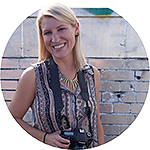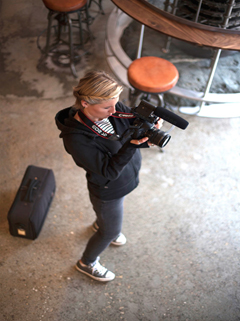MDOCS Welcomes: Jesse Wakeman

Brand new to Skidmore, Jesse Wakeman has found her home as MDOCS program coordinator. No stranger to the world of documentary film, Jesse is also a social media wizard who’s here to help students bridge the gap between their storytelling goals and their means to achieve them.
Jesse sat down with MDOCS Student Representative Sam Grant ’18 to discuss her transition to Skidmore, her hopes for the program and her passion for well-dressed elderly women.
I’m sure I speak for the whole MDOCS program when I say we’re really happy to have you here. Transitioning into Skidmore life can definitely be overwhelming; how are you adjusting?
Weirdly enough, I actually feel really calm. I came at a really good time, because their Storytellers' Institute is in June, and I have plenty of time to prepare. I feel like there are already a plenty of events on the table, I’m just sort of filling in the blanks right now. I’m helping out wherever is needed, and timing-wise, I've been brought on at a really great point. Because we’re still developing plans for Storytellers', I feel I can still be a really integral part of what that’s going to look like, what guests we’re going to bring, and other things like that. It’s all really exciting to me.
Storytellers' Institute 2016 is still in the works, as are the media and film studies minor. How are you hoping to contribute to their growth?
Media and film studies is an independent minor. As program coordinator for MDOCS, I'm collaborating with both the minor and Visual Literacy Forum through the Project Vis Mellon-funded initiative, as we are all contributing to greater media literacy on campus. There’s definitely some cross-promotion already happening, and it's great that we can find ways for even more collaboration there. In terms of Storytellers', I’ll be sitting in one some marketing meetings. We’ll be doing some advertising, hopefully working on some TV commercials, some spots with local programming, things like that. More community outreach, definitely. And then just in terms of students, I think that for the next month or so, our social media push is going to be boosted a lot. I’m a big Facebook user, and I know Jordana really likes Twitter, so we kind of work well in that sense, that we can tackle both of those platforms. For me, I think our Facebook page is missing more information about our programs while they’re here. We’re good at promoting ahead of time, but in terms of what’s going on right now, it’s helpful to see something in your feed that says like “oh, this is happening in Davis soon, I have five minutes to get there, I’ll go check it out.”
That definitely sounds like it would streamline our event planning! Social media is one of your strong suits. Do you have any advice for students who may be trying to apply their knowledge of social media to their professional lives?
I think what’s tricky is communicating your own authentic voice. I think that’s the most powerful way to spread a message, though, using your own unique, authentic story. Applying that to social media is key; I think it’s OK to take a more personal approach with your posts. You don’t always have to sound perfect and professional. That’s what people connect to; otherwise they feel like they’re being preached to, or that it’s an advertisement or something like that. Social media is a space where you can have a bit more fun. There’s definitely a balance to keep in mind, though. We don’t want TMI.

When it comes to the students, have you noticed any trends with Skid students that may be different from students you’ve encountered in the past?
This is my first time working in an educational institution, so mostly I’ve been applying my own personal college experience. I like to say I’m a recent graduate, but I’m now looking at six years because I graduated (from Ithaca) in 2009. I also went to a liberal arts college that prioritized a well-rounded education in different fields. Skidmore sort of reminded me of that. It’s also a very community-driven campus here, which helped reinforce the idea that this is your living space. It’s your bubble. I’m still getting to know the students, and that’ll be a big part of the next few months, you know, both working with the students who are already collaborating with us (in MDOCS) as well as new students who want to get involved. It would also be great to get in touch with students who are attached to certain clubs, because some really great connections could potentially happen there. We need to make sure that everyone knows not just MDOCS exists, but how they can get involved. Once students start finishing some of these projects they’re working on, those are going to serve as examples for people to start seeing what MDOCS is about, and what they can bring to the table.
As far as projects go, have you worked on any independent pieces in recent years? Is there anything doc-related you’d like to accomplish on your own this year?
The last five years, I’ve been working under a director. So, at the end of the day, it’s her ideas that get chosen. As the editor and production manager, my role is to support that idea, and to make it better and stronger in any way I can. So because I’ve been functioning in that position for so long, I’m definitely starting to shift my focus a bit more. In terms of outside projects, there’s so much inspiration I can take from here on campus that I hope will find its way into my own ideas and projects. I do some volunteer work with animal shelters, and that’s an area that I’m personally really interested in. I worked with one in Berkley where I would basically take special-case animals that were in need of really specific adoption circumstances, and I would make a film for them to help promote their adoption. That’s something I do on a personal level, for me. In college I mostly worked on social issue documentaries, so I’d love to tap back into that. I miss those a lot. And I actually pulled a few out of my closet as I was getting packed up and ready to move, and I realized that sadly the DVDs are starting to become pixelated and distorted, so I’ve got to find the raw files again, so I can watch them. Just thinking about that footage reminds me how much I love those films. It’s really sad that the technology I was using six years ago is degrading.
It sounds like you tend to lean towards film documentary, would it be safe to say that’s your favorite medium of doc?
Yeah, I would say so. I’d say it’s what I’m most comfortable in. It’s what I’ve worked with the most, so I understand that industry, and I went to college to study it, so I’m trained on the equipment, and that kind of stuff. But at the same time, I am looking to really explore podcasts and audio doc too. I find that in my personal time, that’s what I’m doing more of at the moment. I am really into documentary film, and in the past, I would watch typically one a week if not more. But now I find that because I’m driving a lot, I’m actually listening to audio docs more. I’m excited to tap into that and see what comes of it. I’m a very visual person, so I’m not sure if it would work for me, but I do think that audio is just as powerful, and I’d love to take on that challenge.
With all that time in the car, is there anything in particular you’re listening to right now?
A lot of the typical audio choices, like This American Life, Radio Lab, Invisibilia…lots of NPR usually.
How about film, what was the last documentary you saw?
I tried to watch 30 (documentary) films in 30 days over the summer, so I think the one I left off on was this one (called Advanced Style) about these older women, mostly in their 70s or older, who are fashion icons living in New York City. So the film follows I think four or five of them, and they’re all retired, and they each have a certain really interesting fashion item they’re known for. The characters in this film are just hysterical, and the lasting message is basically just to live it up until the end. I love films that prove that documentaries don’t have to be sad and depressing. It can be difficult to find examples that are positive and uplifting, but storytelling doesn’t always have to be that way. Of course those types of stories have their place too, but I think being able to talk about happiness is a great thing to be able to put out into the media.
Absolutely! From the little time we’ve spent together, I’d say you’re definitely very easy to talk to. You’re a great resource for students to connect with the MDOCS program, how do you feel being the one to bridge that gap?
I love that idea; I would love to be kind of like the MDOCS ambassador. I feel like I can definitely reach out to students. At my last job, I was in charge of talking to our interns, so they were sort of my little team. We did a lot of projects together and worked really closely, so I’ve gotten used to working with people that are college-aged. I like to think I can be someone you guys can come to, and be a resource for. I think that’s the part of the job that excites me the most: being able to be there for you guys to help tell your stories.
Looking for new docs to check out? In addition to the ones
she mentioned in the interview, Jesse also recommends
This is Life with Lisa Ling. Watch it here.
Want to find out more? Have an idea to share or project to grow? You can reach Jesse at jwakeman(@)skidmore.edu.
